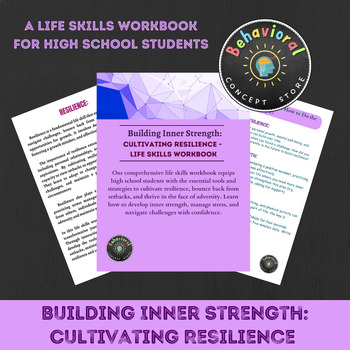Cultivating Resilience: A Guide To Mental Strength

Table of Contents
Understanding Resilience and its Benefits
Resilience is the ability to bounce back from adversity, adapting to stress and challenges while maintaining a positive outlook. It's not about avoiding hardship, but about navigating it effectively. The importance of resilience cannot be overstated; it's a cornerstone of mental well-being and overall success. Understanding the definition of resilience is the first step towards building it. The benefits of resilience are far-reaching and profoundly impact various aspects of your life.
-
Improved mental health and well-being: Resilience acts as a buffer against stress, anxiety, and depression. By building your resilience, you equip yourself with the tools to navigate difficult emotions and maintain a positive mental state.
-
Increased stress management skills: Resilient individuals possess effective coping mechanisms, enabling them to manage stress more effectively and avoid burnout. They can better handle pressure and stressful situations.
-
Enhanced problem-solving abilities: Resilience fosters a proactive approach to problem-solving. Instead of being overwhelmed by challenges, resilient people actively seek solutions and learn from their experiences.
-
Greater self-esteem and confidence: Successfully overcoming adversity boosts self-esteem and confidence. Each challenge conquered strengthens your belief in your own capabilities.
-
Stronger relationships: Resilience allows for better communication and conflict resolution in relationships. It enables you to navigate disagreements constructively and maintain strong bonds.
-
Increased success in personal and professional life: Resilience is crucial for achieving goals, persevering through setbacks, and ultimately succeeding in both personal and professional endeavors. It allows you to maintain momentum even in the face of obstacles.
Developing Key Resilience Skills
Building resilience is not a passive process; it requires actively developing specific skills. These skills become your coping mechanisms, allowing you to navigate challenges effectively.
Problem-solving and Decision-Making
Effective problem-solving is a core component of resilience. When faced with a challenge:
-
Break down problems into smaller, manageable steps: Overwhelmed by a large task? Divide it into smaller, more achievable goals. This approach reduces stress and increases your sense of accomplishment.
-
Identify potential solutions and evaluate their effectiveness: Brainstorm various solutions and assess their pros and cons before making a decision. This approach promotes a more rational and effective response.
-
Learn from past experiences to improve future decision-making: Reflect on past challenges and successes to identify patterns and improve your decision-making process. This iterative approach helps you develop sharper judgment.
Emotional Regulation
Managing emotions is paramount to building resilience. Learning to regulate your emotions prevents them from overwhelming you during difficult times.
-
Practice mindfulness and meditation to manage emotions: Mindfulness techniques help you become more aware of your emotions and manage them without judgment. Meditation can significantly reduce stress and promote emotional stability.
-
Identify and challenge negative thought patterns: Negative self-talk can hinder resilience. Identify these patterns and actively challenge their validity. Replace negative thoughts with more positive and realistic ones.
-
Develop healthy coping mechanisms for stress and anxiety: Engage in healthy coping mechanisms, such as exercise, spending time in nature, or engaging in hobbies, to manage stress and anxiety effectively.
Building a Strong Support System
Having a strong support system is crucial for building resilience. Surrounding yourself with supportive individuals provides a safety net during challenging times.
-
Nurture relationships with family, friends, and mentors: Maintain strong relationships with people who offer emotional support, understanding, and encouragement.
-
Seek professional help when needed (therapy, counseling): Don't hesitate to seek professional help if you're struggling. Therapists and counselors provide valuable guidance and support in building resilience.
-
Join support groups or online communities: Connecting with others facing similar challenges can provide comfort, shared experiences, and practical advice.
Lifestyle Choices for Enhanced Resilience
Your lifestyle significantly impacts your resilience. Prioritizing physical and mental well-being lays a solid foundation for navigating adversity effectively.
Prioritize Physical Health
Physical health directly influences mental well-being and resilience.
-
Regular exercise to reduce stress and improve mood: Physical activity releases endorphins, which have mood-boosting effects. Aim for at least 30 minutes of moderate-intensity exercise most days of the week.
-
Maintain a balanced and nutritious diet: Nourish your body with a balanced diet rich in fruits, vegetables, and whole grains. Proper nutrition fuels your brain and body, enhancing your ability to cope with stress.
-
Ensure sufficient sleep for optimal cognitive function: Adequate sleep is crucial for cognitive function, emotional regulation, and overall well-being. Aim for 7-9 hours of quality sleep each night.
Mindfulness and Self-Care
Integrating mindfulness and self-care practices into your routine boosts resilience.
-
Practice mindfulness techniques (meditation, yoga): Mindfulness helps you stay grounded and present, reducing stress and promoting emotional regulation.
-
Engage in relaxing activities that you enjoy: Make time for activities that bring you joy and relaxation, such as reading, listening to music, spending time in nature, or pursuing hobbies.
-
Prioritize self-care and avoid burnout: Pay attention to your needs and take breaks when needed. Avoid pushing yourself to the point of burnout, which can significantly compromise your resilience.
Conclusion
Cultivating resilience is a journey, not a destination. By understanding its benefits, developing key skills, and adopting a supportive lifestyle, you can significantly increase your mental strength and ability to overcome life's challenges. Remember that building resilience is a continuous process requiring ongoing effort and self-compassion. Strengthening your mental resilience is an investment in your overall well-being and success.
Start building your resilience today! Explore the resources mentioned above and discover the power of mental strength. Learn more about cultivating resilience and unlocking your potential for overcoming adversity and thriving.

Featured Posts
-
 Analyzing The Buy Canadian Movement The Effect Of Tariffs On Beauty
May 21, 2025
Analyzing The Buy Canadian Movement The Effect Of Tariffs On Beauty
May 21, 2025 -
 Outrun Movie Michael Bay Directing Sydney Sweeney Cast
May 21, 2025
Outrun Movie Michael Bay Directing Sydney Sweeney Cast
May 21, 2025 -
 Vybz Kartels New York Concert A Landmark Event In Dancehall History
May 21, 2025
Vybz Kartels New York Concert A Landmark Event In Dancehall History
May 21, 2025 -
 Giakoymakis I Kroyz Azoyl Ston Teliko Toy Champions League
May 21, 2025
Giakoymakis I Kroyz Azoyl Ston Teliko Toy Champions League
May 21, 2025 -
 D Wave Quantum Qbts Revolutionizing Drug Discovery With Quantum Ai
May 21, 2025
D Wave Quantum Qbts Revolutionizing Drug Discovery With Quantum Ai
May 21, 2025
Latest Posts
-
 Flintoffs Honest Reflection The Horror Car Crash And His Near Death Experience
May 23, 2025
Flintoffs Honest Reflection The Horror Car Crash And His Near Death Experience
May 23, 2025 -
 Freddie Flintoffs Car Crash I Wish I D Died He Admits
May 23, 2025
Freddie Flintoffs Car Crash I Wish I D Died He Admits
May 23, 2025 -
 Freddie Flintoffs Accident A Disney Documentary Tells The Story
May 23, 2025
Freddie Flintoffs Accident A Disney Documentary Tells The Story
May 23, 2025 -
 Tribute To Andy Peebles Andy Bayes Reflects On Bbc Lancashire Career
May 23, 2025
Tribute To Andy Peebles Andy Bayes Reflects On Bbc Lancashire Career
May 23, 2025 -
 Andrew Flintoffs Career Explored In New Disney Film
May 23, 2025
Andrew Flintoffs Career Explored In New Disney Film
May 23, 2025
